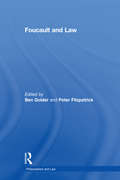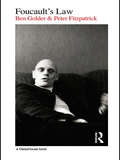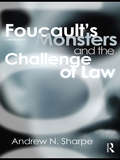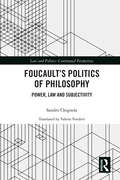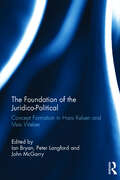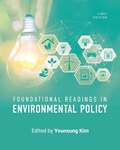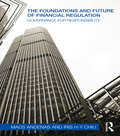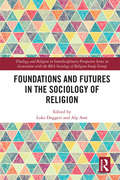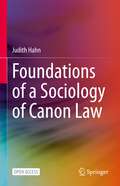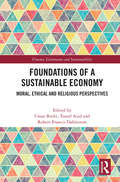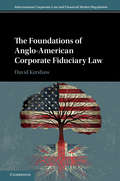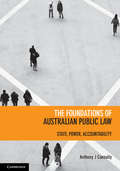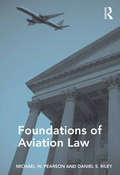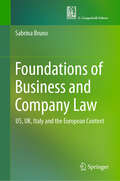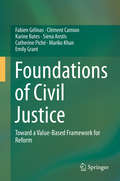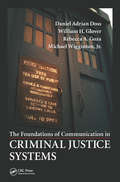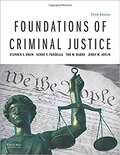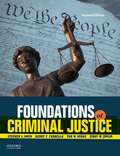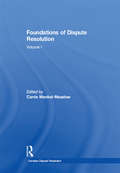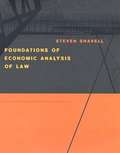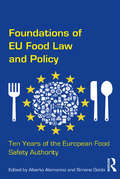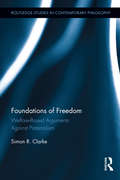- Table View
- List View
Foucault and Law: On Law, Power And Rights (Philosophers And Law Ser.)
by Ben Golder Peter FitzpatrickFew thinkers can have had a more diverse or a more contested impact on theorizing law than Michel Foucault. This diversity is reflected in the wide range of Foucault's work and of the intellectual fields it has so conspicuously influenced. Such diversity informs the present collection and is signalled in the headings of its four sections: � Epistemologies: archaeology, discourse, Orientalism � Political philosophy: discipline, governmentality and the genealogy of law � Embodiment, difference, sexuality and the law � The subject of rights and ethics. Whilst the published work selected for this collection amply accommodates this diversity, it also draws together strands in Foucault's work that coalesce in seemingly conflicting theories of law. Yet the editors are also committed to showing how that very conflict goes to constitute for Foucault an integral and radical theory of law. This theory ranges not just beyond the restrained and diminished conceptions of law usually derived from Foucault, but also beyond the characteristic concern in Jurisprudence and Legal Philosophy to constitute law in its difference and separation from other socio-political forms.
Foucault, Crime and Power: Problematisations of Crime in the Twentieth Century
by Christian BorchThis book presents a Foucauldian problematisation analysis of crime, with a particular focus on the twentieth century. It considers how crime has been conceived as problem and, by scrutinising the responses that have been adapted to deal with crime, demonstrates how a range of power modalities have evolved throughout the twentieth century. Christian Borch shows how the tendency of criminologists to focus on either disciplinary power or governmentality has neglected the broader complex of Foucault’s concerns: ignoring its historical underpinnings, whilst for the most part limiting studies to only very recent developments, without giving sufficient attention to their historical backdrop. The book uses developments in Denmark – developments that can be readily identified in most other western countries – as a paradigmatic case for understanding how crime has been problematised in the West. Thus, Foucault, Crime and Power: Problematisations of Crime in the Twentieth Century demonstrates that a Foucauldian approach to crime holds greater analytical potentials for criminological research than have so far been recognized.
Foucault's Law
by Ben Golder Peter FitzpatrickFoucault’s Law is the first book in almost fifteen years to address the question of Foucault’s position on law. Many readings of Foucault’s conception of law start from the proposition that he failed to consider the role of law in modernity, or indeed that he deliberately marginalized it. In canvassing a wealth of primary and secondary sources, Ben Golder and Peter Fitzpatrick rebut this argument. They argue that rather than marginalize law, Foucault develops a much more radical, nuanced and coherent theory of law than his critics have acknowledged. For Golder and Fitzpatrick, Foucault’s law is not the contained creature of conventional accounts, but is uncontainable and illimitable. In their radical re-reading of Foucault, they show how Foucault outlines a concept of law which is not tied to any given form or subordinated to a particular source of power, but is critically oriented towards alterity, new possibilities and different ways of being. Foucault’s Law is an important and original contribution to the ongoing debate on Foucault and law, engaging not only with Foucault’s diverse writings on law and legal theory, but also with the extensive interpretive literature on the topic. It will thus be of interest to students and scholars working in the fields of law and social theory, legal theory and law and philosophy, as well as to students of Foucault’s work generally.
Foucault's Monsters and the Challenge of Law
by Alex SharpeIn contrast to other figures generated within social theory for thinking about outsiders, such as Rene Girard’s ‘scapegoat’ and Zygmunt Bauman’s ‘stranger’, Foucault’s Monsters and the Challenge of Law suggests that the figure of ‘the monster’ offers greater analytical precision and explanatory power in relation to understanding the processes whereby outsiders are constituted. The book draws on Michel Foucault’s theoretical and historical treatment of the category of the monster, in which the monster is regarded as the effect of a double breach: of law and nature. For Foucault, the monster does not simply refer to a particular kind of morphological or psychological irregularity; for the body or psyche in question must also pose a threat to the categorical structure of law. In chronological terms, Foucault moves from a preoccupation with the bestial human in the Middle Ages to a concern over Siamese or conjoined twins in the Renaissance period, and ultimately to a focus on the hermaphrodite in the Classical Age. But, although Foucault’s theoretical framework for understanding the monster is affirmed here, this book's study of an English legal history of the category ‘monster’ challenges some of Foucault’s historical claims. In addition to considering this legal history, the book also addresses the contemporary relevance of Foucault’s theoretical framework. Structured around Foucault’s archetypes and the category crises they represent – admixed embryos, conjoined twins and transsexuals – the book analyses their challenge to current distinctions between human and animal, male and female, and the idea of the ‘proper’ legal subject as a single embodied mind. These contemporary figures, like the monsters of old, are shown to threaten the rigidity and binary structure of a law that still struggles to accommodate them.
Foucault's Politics of Philosophy: Power, Law, and Subjectivity (Law and Politics)
by Sandro ChignolaOriented around the theme of a ‘politics of philosophy’, this book tracks the phases in which Foucault’s genealogy of power, law, and subjectivity was reorganized during the 14 years of his teaching at the College de France, as his focus shifted from sovereignty to governance. This theme, Sandro Chignola argues here, is the key to understanding four features of Foucault’s work over this period. First, it foregrounds its immediate political character. Second, it demonstrates that Foucault’s "Greek trip" also aims at a politics of the subject that is able to face the processes of the governmentalization of power. Third, it makes clear that the idea of the "government of the self" is – drawing on an ethics of intellectual responsibility that is Weberian in origin – an answer to the processes that, within neoliberal governance, produce the subject as an individual (as a consumer, a market agent, an entrepreneur, and so on). Fourth, the theme of a ‘politics of philosophy’ implies that Foucault’s research was never simply scholarly or neutral; but rather was characterized by a specific political position. Against recent interpretations that risk turning Foucault into a scholar, here then Foucault is re-presented as a key figure for jurisprudential and political-philosophical research.
The Foundation and Construction of Ethics
by Franz BrentanoChosen and edited by Franziska Mayer-Hillebrand, translated by Elizabeth Hughes Schneewind, this collection of essays reflects Brentano's lectures at the University of Vienna from 1876 to 1894.
The Foundation of the Juridico-Political: Concept Formation in Hans Kelsen and Max Weber
by Peter Langford Ian Bryan John McGarryHans Kelsen and Max Weber are conventionally understood as initiators not only of two distinct and opposing processes of concept formation, but also of two discrete and contrasting theoretical frameworks for the study of law. The Foundation of the Juridical-Political: Concept Formation in Hans Kelsen and Max Weber places the conventional understanding of the theoretical relationship between the work of Kelsen and Weber into question. Focusing on the theoretical foundations of Kelsen’s legal positivism and Weber’s sociology of law, and guided by the conceptual frame of the juridico-political, the contributors to this interdisciplinary volume explore convergences and divergences in the approach and stance of Kelsen and Weber to law, the State, political science, modernity, legal rationality, legal theory, sociology of law, authority, legitimacy and legality. The chapters comprising The Foundation of the Juridical-Political uncover complexities within as well as between the theoretical and methodological principles of Kelsen and Weber and, thereby, challenge the enduring division between legal positivism and the sociology of law in contemporary discourse.
Foundational Readings in Environmental Policy
by Younsung KimThrough an enlightening collection of academic articles, Foundational Readings in Environmental Policy deepens and broadens students' knowledge of the root cause of environmental policy and also provides suggested solutions to mitigate environmental impacts. Students are encouraged to better understand the complex nature of environmental issues, today's environmental policy approaches, and technologies and approaches that can create a more sustainable future. The anthology is organized into the units. Unit I covers the fundamental principles of environmental policy and politics. The readings explore the main features of environmental policy, how it differs from public policy, how policy is formed, the key actors involved in implementing policies, and more. Unit II outlines environmental issues beyond geographic boundaries and which are not limited to the natural/ecological realm. The readings focus on climate change, energy, and biodiversity loss. The final unit discusses emerging environmental issues and policy approaches, including environmental inequality, waste management, sustainable businesses, issues related to energy access in developing countries, and strategies for the future. Filling a gap in the current literature, Foundational Readings in Environmental Policy is an ideal resource for courses and programs in environmental policy.
The Foundations and Future of Financial Regulation: Governance for Responsibility
by Mads Andenas Iris H-Y ChiuFinancial regulation has entered into a new era, as many foundational economic theories and policies supporting the existing infrastructure have been and are being questioned following the financial crisis. Goodhart et al’s seminal monograph "Financial Regulation: Why, How and Where Now?" (Routledge:1998) took stock of the extent of financial innovation and the maturity of the financial services industry at that time, and mapped out a new regulatory roadmap. This book offers a timely exploration of the "Why, How and Where Now" of financial regulation in the aftermath of the crisis in order to map out the future trajectory of financial regulation in an age where financial stability is being emphasised as a key regulatory objective. The book is split into four sections: the objectives and regulatory landscape of financial regulation; the regulatory regime for investor protection; the regulatory regime for financial institutional safety and soundness; and macro-prudential regulation. The discussion ranges from theoretical and policy perspectives to comprehensive and critical consideration of financial regulation in the specifics. The focus of the book is on the substantive regulation of the UK and the EU, as critical examination is made of the unravelling and the future of financial regulation with comparative insights offered where relevant especially from the US. Running throughout the book is consideration of the relationship between financial regulation, financial stability and the responsibility of various actors in governance. This book offers an important contribution to continuing reflections on the role of financial regulation, market discipline and corporate responsibility in the financial sector, and upon the roles of regulatory authorities, markets and firms in ensuring the financial health and security of all in the future.
Foundations and Futures in the Sociology of Religion (Theology and Religion in Interdisciplinary Perspective Series in Association with the BSA Sociology of Religion Study Group)
by Luke Doggett Alp AratSince the sociology of religion became recognised as a distinct sub-discipline over the last century, the dominance of approaches taking their inspiration from the sociological classics has increasingly been challenged. Empirical findings have brought the notion of secularisation into question; and theorists have sought to deconstruct how we think of ‘religion.’ This collection appraises the continuing influence of the foundational approaches and places these in relation to newly emerging directions in the field. The book is divided into four sections, each section containing one ‘foundational’ chapter written by an established academic followed by two ‘futures’ chapters contributed by emerging scholars in the sub-discipline. These chapters complement one another by placing the overview of future directions in the context of a survey of the development of the sociology of religion over the last century. Topics discussed in these chapters include lived religion, sexuality, ritual, religion and the media. Combining erudite examinations of the British Sociological Association Sociology of Religion Study Group’s work so far with explorations of the future directions its research might take, this book is vital reading for any scholar whose work combines religious studies and sociology.
Foundations of a Sociology of Canon Law
by Judith HahnThis "Open Access" book investigates the legal reality of the church through a sociological lens and from the perspective of canon law studies, the discipline which researches the law and the legal structure of the Catholic Church. It introduces readers from various backgrounds to the sociology of canon law, which is both a legal and a theological field of study, and is the first step towards introducing a new subdiscipline of the sociology of canon law. As a theoretical approach to mapping out this field, it asks what theology and canon law may learn from sociology; it discusses the understanding of “law” in religious contexts; studies the preconditions of legal validity and effectiveness; and based on these findings it asks in what sense it is possible to speak of canon “law”. By studying a religious order as its struggles to find a balance between continuity and change, this book also contributes to the debates on religious law in modernity and the challenges it faces from secular states and plural societies. This book is of interest to researchers and students of the sociology of law, legal studies, law and religion, the sociology of religion, theology, and religious studies.This is an open access book.
Foundations of a Sustainable Economy: Moral, Ethical and Religious Perspectives (Finance, Governance and Sustainability)
by Umar BurkiThis book addresses current practices related to sustainable development, its challenges and the future. People belonging to different genders regardless of their age, social class and education should be equal as citizens and individuals, and identical in their rights and responsibilities. The business sector, authorities, societies and religious circles have the potential to play a fundamental role in curbing social ills and the degradation of the environment in this modern world. The authors of this book argue that without good governance, the status of a human being is unlikely to improve. They make the case that to achieve sustainability, government, society and the economy must ensure a platform for people to participate in decision-making and benefit from the rights they are accorded. By covering a range of perspectives across economic, social and moral life, the book will shed light on the problems and possible solutions to sustainable development and the triple bottom line, of people, planet and profit, under the umbrella of morals and divine law. This will be a useful guide for undergraduate and postgraduate students across multiple disciplines, such as economics, religious studies, business studies, political science, anthropology and sociology.
The Foundations of Anglo-American Corporate Fiduciary Law (International Corporate Law and Financial Market Regulation)
by David KershawThis book explores the foundations and evolution of modern corporate fiduciary law in the United States and the United Kingdom. Today US and UK fiduciary law provide very different approaches to the regulation of directorial behaviour. However, as the book shows, the law in both jurisdictions borrowed from the same sources in eighteenth- and nineteenth-century English fiduciary and commercial law. The book identifies the shared legal foundations and authorities and explores the drivers of corporate fiduciary law's contemporary divergence. In so doing it challenges the prevailing accounts of corporate legal change and stability in the US and the UK.
The Foundations of Australian Public Law: State, Power, Accountability
by Connolly Anthony JIn The Foundations of Australian Public Law, Anthony J. Connolly brings together the two traditionally discrete areas of constitutional and administrative law to present Australian public law as a single, integrated body. Exploring the themes of state, power and accountability in Australia, the text also makes reference to the law of international jurisdictions, where students are informed by contemporary public law theory. Particular attention is also given to the rise of global public law and the increasingly cosmopolitan nature of the subject in Australia. A comprehensive companion website complements the theory and discussion throughout the text and includes chapter summaries, further readings and discussion questions to encourage extended student learning. Written by a leader in the field, The Foundations of Australian Public Law is a key text for students looking to gain a comprehensive understanding of public law across Australia's federal, state and territory jurisdictions.
Foundations of Aviation Law
by Michael W. Pearson Daniel S. RileyFoundations of Aviation Law is an easy-reading general primer into the often complex world of aviation law, written for aviation students as well as legal professionals who are looking for broad-based, introductory coverage of the subject. The text begins with basic legal concepts that build a foundation for in-depth exploration of aviation-specific subject matter. This allows the instructor to utilize one text in situations where a basic foundation in law is required before moving into aviation law specifics. It includes citations to relevant and key court decisions that provide a solid underpinning for the student of aviation law. The book is divided into six general categories, with fifteen relevant sub-chapters, allowing focused learning into particular areas of law. Throughout it features chapter summaries, key word indices and review questions. The design easily allows instructors to develop syllabi that spotlight the specific area of law that they are interested in exploring, providing comprehensive coverage of both traditional introductory legal concepts and topical aviation subject matter.
Foundations of Business and Company Law: US, UK, Italy and the European Context
by Sabrina BrunoThis textbook focuses on the interrelationships between economic elements and legal principles with regard to business and company law. Three jurisdictions are taken into consideration: US, UK, and Italian law (the last of which was chosen as a “prototype” of continental European legal systems). The economic elements underlying business and company law are actually common to the three legal systems and, consequently, their legal principles and rules are similar despite one jurisdiction (namely, Italy) being based on civil law and the other two on common law. Their similarities are also due to the historical origins of the legal instruments that are covered by the book: partnership law dates back to the Romans, while company law can be traced back to English law. Roman law and English law have influenced, respectively, partnership law and company law around the globe. The book addresses the following topics: proprietorship law, partnership law and company law. For each topic, it first identifies the economic and legal elements that are shared by the three jurisdictions, then explores each one separately to highlight the differences. The textbook is based on over thirty years of research on business and company law conducted by the author in Italy, the UK and US and more than fifteen years of teaching this subject to international students at Luiss G. Carli University of Rome as part of its Bachelor of Economics and Business program.
Foundations of Civil Justice
by Fabien Gélinas Clément Camion Karine Bates Siena Anstis Catherine Piché Mariko Khan Emily GrantThis book reviews the knowledge corpus about access to civil justice across disciplines and legal traditions and proposes a new research framework for civil justice reform. This framework is intended to foster further critical analysis of the justice system in a systematic and organized way. In particular, the framework underlines the tensions between different values considered as central to the civil justice system, and in doing so potentially allows for conscious, reflected and enlightened choices about the values that are to be prioritized in the reform of justice systems.
The Foundations of Communication in Criminal Justice Systems
by Daniel Adrian Doss William H. Glover Jr. Rebecca A. Goza Michael Wigginton Jr.Myriad forms of communication occur within the criminal justice system as judges and attorneys speak to juries, law enforcement officers interact with the public, and the news media presents stories of events in courtrooms. Hindrances abound, however. Law enforcement officers and justice system personnel often encounter challenges that affect their
Foundations of Criminal Justice
by Stephen S. Owen Henry F. Fradella Tod W. Burke Jerry W. JoplinWhat is law? What is deviance? What is justice? How is justice achieved through law, punishment, and criminal justice agencies? Now in its third edition, Foundations of Criminal Justice uses a unique approach that provides students with the framework and the intellectual tools that they will need in order to critically analyze and evaluate the nature, sources, scope, purposes, and practical limitations of the criminal justice system. <p><p> This is the only introductory survey text that moves beyond a description of the criminal justice system, helping students understand the role of criminal justice in their lives as criminal justice practitioners and as active citizens.
Foundations Of Criminal Justice (Second Edition)
by Stephen S. Owen Henry F. Fradella Tod W. Burke Jerry W. JoplinWhat is law? What is deviance? What is justice? How is justice achieved through law, punishment, and criminal justice agencies? Foundations of Criminal Justice, Second Edition, uses a unique approach that provides students with the framework and the intellectual tools that they will need in order to critically analyze and evaluate the nature, sources, scope, purposes, and practical limitations of the criminal justice system. This is the only introductory survey text that moves beyond a description of the criminal justice system, helping students understand the role of criminal justice in their lives as criminal justice practitioners and as active citizens.
Foundations of Dispute Resolution: Volume I (Complex Dispute Resolution)
by Carrie Menkel-MeadowThis volume brings together leading research articles in to the theory, research findings and applications of modern dispute resolution. The articles relate to a wide variety of settings and cover the primary processes of negotiation, mediation and arbitration, as well as exploring combinations and hybridization of those processes. Also included are articles on the search for 'value-added' or 'pie-expanding' creative solutions; the choosing of strategies, based on game theory, economics and social and cognitive psychology; how foundational theories have been altered or modified, depending on contexts, and numbers of parties and issues; and what issues are raised by the 'privatization of justice'. The articles span both the 'science' and 'art' of dispute resolution, consider the relationship of peace to justice and include both empirical (descriptive) and normative (prescriptive) assessments of how these processes of dispute resolution function.
Foundations Of Economic Analysis Of Law
by Steven ShavellIn this book Steven Shavell provides an in-depth analysis and synthesis of the economic approach to the building blocks of our legal system, namely, property law, tort law, contract law, and criminal law. He also examines the litigation process as well as welfare economics and morality. Aimed at a broad audience, this book requires neither a legal background nor technical economics or mathematics to understand it. Because of its breadth, analytical clarity, and general accessibility, it is likely to serve as a definitive work in the economic analysis of law.
Foundations of EU Food Law and Policy: Ten Years of the European Food Safety Authority
by Alberto Alemanno Simone GabbiThis volume presents the viewpoints of academics, food lawyers, industry and consumer representatives as well as those of EU policymakers on the first ten years of activity of one of the most prominent European agencies. Its broader purpose, however, is to discuss the future role played by EFSA within the rapidly-evolving area of EU food law and policy. By revisiting and discussing the milestones in the history of EFSA, the collection provides forward-looking views of food leaders and practitioners on the future scientific and regulatory challenges facing the European Union. In particular, by presenting a critical assessment of the agency’s activities within its different areas of work, the book offers readers a set of innovative tools for evaluating policy recommendations and better equips experts and the public to address pressing regulatory issues in this emotive area of law and policy. Despite its celebratory mood, the book’s focus is more about the future than the past of EU food law and policy. Each chapter discusses how EFSA’s role has evolved and identifies what it should have done differently while presenting an overall assessment of how the agency has discharged its mandate.
Foundations of Freedom: Welfare-Based Arguments Against Paternalism (Routledge Studies in Contemporary Philosophy)
by Simon R. ClarkeWhat makes individual freedom valuable? People have always believed in freedom, have sought it, and have sometimes fought and died for it. The belief that it is something to be valued is widespread. But does this belief have a rational foundation? This book examines answers to these questions that are based on the welfare of the person whose freedom is at stake. There are various conceptions of a worthwhile life, a life that is valuable for the person whose life it is. These conceptions will be examined to see whether they are plausible and what their connection, if any, is to freedom. Are they compelling foundations for freedom? Does freedom make a person’s life better or would his/her welfare be advanced by restricting freedom?
Foundations of Higher Education Law and Policy: Basic Legal Rules, Concepts and Principles for Student Affairs
by Peter F. LakeFoundations Of Higher Education Law And Policy: Basic Legal Rules, Concepts And Principles For Student Affairs
